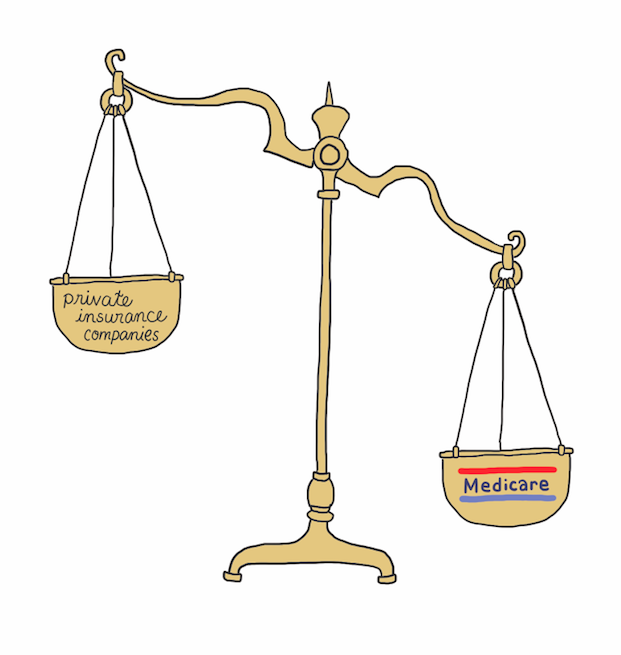A Conservative Case Against Medicare for All
October 16, 2019
On its surface, giving everyone free health care sounds like a great idea. Advocates for Medicare for All strike a chord with many Americans when they describe the tragedies happening everywhere from hospitals to small-town pharmacies — patients unable to afford life-saving drugs, cancer treatments and vital medications. Under a single-payer health care system, these problems would be eliminated. No one would be denied care because of their financial status or pre-existing condition(s). But a closer look into what Medicare for All entails shows that it would do more damage than good.
For one, Medicare reimbursement rates to care providers are consistently and significantly — at least 40% by one estimate — lower than private insurance reimbursement rates. According to Stanford researchers, hospitals stand to lose as much as $151 billion in annual revenues under a system with little to no private insurance. We can discuss the answer to the moral question of whether or not hospitals should lose this much money, but the real question is will they tolerate it? Already, Medicare non-participation rates — that is, the rate of doctors who refuse to see patients covered by Medicare — exceed 20% in Nevada and Virginia, so it would be naïve to believe that all physicians would decide to see patients under these lower rates nationwide.
A common retort from Medicare for All supporters is that all other developed countries have single-payer healthcare systems. This isn’t so straightforward. A lot of these “single-payer” systems aren’t highly centralized in the way that many of the Democrats are proposing. In Finland, one of the Scandinavian nations lauded by Sen. Bernie Sanders and others, the administration of healthcare is handled at the local level. Many of the countries that do use highly centralized systems, such as the Netherlands, Singapore and Taiwan, have populations comparable to a single U.S. state, and the relative affluence of their citizenry allows them to sidestep long wait times. Blanket comparisons like “Well, every other developed country besides the U.S. does X, therefore so should we,” play into apple-to-orange scenarios that don’t get to solutions that would work best for the United States.
Another popular claim is that health care is better in countries with policies similar to Medicare for All. The United States has the highest survival rates in the world. In fact, how many of our higher than average survival rates are specifically a result of the United States doing the heavy lifting when it comes to biomedical research and development. In the 15-year period between 1988 and 2003, the U.S. invested more than five times as much as the entire European Union did into private biotechnology companies. And it is almost certain that because the United States is the sole industrialized country not to utilize pharmaceutical price controls, our research and development in the pharmaceutical industry is unparalleled compared to any other country on Earth. A single-payer system would lead to a roughly 24% decline in the research and development industry. This would decimate the short-term prospects of cures for cancer, HIV/AIDS and other crushing diseases for not just us, but the rest of the world that greatly benefits from our developments.
Additionally, between Social Security and Medicare, the United States faces unfunded liabilities of almost $126 trillion. That’s nearly $400,000 per citizen. How can we trust this same government to deliver us a program that would cost, conservatively, over $3.26 trillion annually? Social Security was another radically progressive idea for its time, a bastion of President Roosevelt’s New Deal. But today, anyone under the age of 50 should be worrying about whether or not they will ever see their contributions returned. It’s estimated that the Social Security trust fund will run out of money by the mid-2030s. It seems to me if a government cannot be trusted to handle Social Security, they shouldn’t be creating more programs like it without first figuring out how to fund their existing liabilities.
Perhaps we can learn from states like Maine that have successfully implemented high-risk pools without making those with pre-existing conditions pay any more for care. As PBS explained, “When a resident applied for health insurance, they had to fill out a questionnaire. If they had certain medical conditions known to be costly, their application was flagged for the high-risk pool. To consumers, it was seamless: They paid regular premiums and got the same sort of coverage as any other enrollee in their chosen health plan.” These plans were funded from two sources: the insurance policy premiums paid by patients within that high-risk pool and a $4 monthly surcharge on all policyholders in the state. The catch is that it was well-funded, but nevertheless, it worked.
Our nation’s biomedical research industry benefits the entire world. Without it, other countries’ single-payer systems would be meaningless. It won’t matter how much you pay for your care if the treatments don’t exist. Someone has to do the heavy lifting, and while I wish other countries did more, we are currently keeping the ship afloat. If we cut funding to our valuable research industry, ripple effects will be felt across the world. So instead of doing just that, perhaps we should take a step back to think about how we can lower costs while at the same time maintaining the crucial role which private insurance provides to our great medical advancements.














Makameh Afkhami (Ms) • Nov 8, 2020 at 10:46 am
Thank you for the article as I was googling the reasons behind the conservative stance against Medicare for all. Frankly this did not answer my question as funding is something that can be tackled as long as a nation has their priorities straight. Do they want to spend money on armaments for instance or medical research? Anyway not getting into the moral or philosophical discussions I understand your point About “ It won’t matter how much you pay for your care if the treatments don’t exist.”. However, conversely, what is the point of having the best treatments or medications in the world when the vast majority of people cannot afford it? At the same time let’s not forget that the pharma business is heavily into profiteering and not spending the higher costs on the greater good. The recent court order for penalties and closure of a specific private pharma cOmpany as a major contributor to the opioid crisis is a case in point. So an important point neglected here is the greed that the US pharma industry is grappling with, to the dismay and detriment of the nation. I always believe when there is a will there is a way, as long as we get over our biases. All the best.